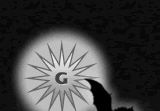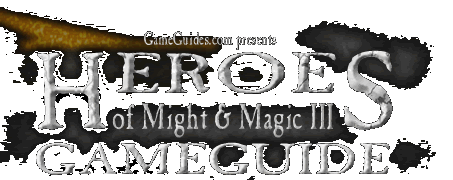 |
 |

Tactical combat is obviously a huge part of Heroes III. Once all your troops are recruited and your buildings bought, victory is decided on the battlefield. But there are a lot of things to consider in combat besides which troops to throw at your enemy. Spells have a great influence on combat, as do luck, morale, heroes, and even terrain. In this section, we'll discuss various factors that can influence combat. We'll start with the importance of heroes and your units' speeds, and follow with the two new functions of Heroes III combat: wait and guard. We'll then discuss obstacles and terrain. Following that are morale, luck, and sieges. Spells of course affect combat, but they are covered in spells section. Most of that section is devoted to the tactical use of spells, so refer to that for tips and overviews of effective spellcasting in combat.
During combat, attack and defense factor heavily into the battles. Basically, every time two stacks meet, the computer compares the attacker's attack rating against the defender's defense rating. For every attack point above the defense rating, the attacker does 5 percent more damage, but if the defender has a higher defense than the attack, then every point of defense above the attacker's attack skill results in 2 percent less damage. For example, assume an angel attacks a minotaur king. The angel has 20 attack, 20 defense, and deals 50 damage. The minotaur king has 15 attack, 15 damage, and deals 12-20 damage. When the angel attacks the minotaur king, it does 25 percent more damage (20 attack minus 15 defense equals 5 multiplied by 5 percent), so it delivers 63 damage to the minotaur king, which is now dead. But if the minotaur king had attacked first, it would do 10 percent less damage (20-15=5x2 percent), doing 11-18 damage. Where heroes come in is they add their attack and defense skill to that of all the creatures in their army. Let's say that a dungeon overlord with 10 attack and 11 defense is commanding the minotaur king, while a cleric of 1 attack and 0 defense is commanding the angel. Now, when the angel attacks, it does 10 percent less damage (26-21=5x2 percent), dealing only 45 damage. Now the minotaur king lives, and when it attacks, it does 25 percent more damage, (25-20=5x5 percent) doing 14-24 damage. This is an extreme example because the minotaur is so much weaker than the angel, but when commanding creatures of similar level, a heroes' attack and defense skills can turn the tide of battle. It is thus important to increase your heroes' attack and defense skills. With high attack, even lowly hobgoblins can become awesome killers, which is the idea behind giving the barbarian such high starting attack. Keep the attack and defense modifiers in mind in combat, so you can judge for yourself whether an attack will succeed and fail and whether you can stay for that one last round or whether you have to flee. Some heroes also have a specialty in a particular troop, which further enhances the attack or defense of the given unit. Any hero who has a creature specialty gives that unit a bonus +1 to attack, defense, and speed.
Speed is a very important statistic in battle because it decides who goes first. Basically, the unit with the higher speed goes first, giving that creature's owner initiative, meaning he can act first. You could thus have a dragon fly in your army and be ensured of first action against any army composed of first through fifth-level troops. You could thus flee or cast a spell before the other hero could even act. You can see why high speed and initiative are important because you could immediately slay an enemy archer stack with a lightning bolt or haste your lizardmen stack. In the first example, you have already taken away one enemy stack before the enemy hero could react, while in the second example, you have ensured that your lizardmen fire before the archers. When two units of the same speed meet in battle, the attacker goes first. So if a hero with royal griffins attacks a hero with obsidian gargoyles, the royal griffins, being the attackers, would go first. Keep speed in mind before attacking any enemy army. If you take an army of dwarves, stone golems, and zombies to battle marksmen, grand elves, and zealots, you will be dead before you can move because your three stacks are slower than the slowest stack on the enemy side. Speed cannot be underestimated as a deciding factor in combat.
|